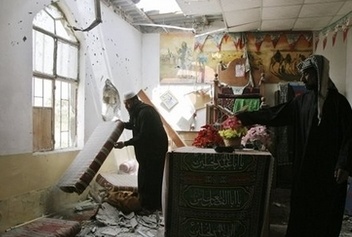Truce calms Iraq, weakens prime minister
(Agencies)
Updated: 2008-04-01 13:18
Updated: 2008-04-01 13:18
BAGHDAD -- Rockets fell on the Green Zone and random machine gun fire rang out Monday in the southern city of Basra as Shiite cleric Muqtada al-Sadr sought to rein in his militia after a week of battles that claimed about 400 lives.
The peace deal between al-Sadr and Iraqi government forces -- said to have been brokered in Iran -- calmed the violence but left the cleric's Mahdi Army intact and Iraq's US-backed prime minister politically battered and humbled within his own Shiite power base.
|
|
Prime Minister Nouri al-Maliki had promised to crush the militias that have effectively ruled Basra for nearly three years. The US military launched air strikes in the city to back the Iraqi effort.
But the ferocious response by the Mahdi Army, including rocket fire on the US-controlled Green Zone and attacks throughout the Shiite south, caught the government by surprise and sent officials scrambling for a way out of the crisis.
The confrontation enabled al-Sadr to show that he remains a powerful force capable of challenging the Iraqi government, the Americans and mainstream Shiite parties that have sought for years to marginalize him. And the outcome cast doubt on President Bush's assessment that the Basra battle was "a defining moment" in the history "of a free Iraq."
With gunmen again off the streets, a round-the-clock curfew imposed in Baghdad last week was lifted at 6 a.m. Monday, except in Sadr City and two other Shiite neighborhoods. Streets of the capital buzzed with traffic and commerce.
Several rockets or mortars slammed Monday into the Green Zone, the nerve center of the American mission in Iraq. But the US Embassy said there no reports of serious injuries. At least two Americans working for the US government were killed in Green Zone attacks last week.
An American soldier was killed Monday by a roadside bomb in northeastern Baghdad, the US military said without specifying whether the attack occurred in a Shiite or Sunni area. The military also said a US soldier wounded south of Baghdad on March 23 died Sunday in Germany.
US Defense Secretary Robert Gates said in Copenhagen, Denmark that the violence in Shiite areas had not changed American plans to withdraw more combat forces this spring.
Republican Sen. John McCain, who has linked his presidential campaign to the conduct of the war, said he was "surprised" that al-Maliki had ordered an operation in Basra rather than keeping the focus on fighting al-Qaida in Iraq in the northern city of Mosul.
Fighting in the south helped make March the deadliest month for Iraqis since last summer, according to figures compiled by The Associated Press.
At least 1,247 Iraqis, including civilians and security personnel, had been killed as of Monday, according to figures compiled from police and US military reports. The figure was nearly double the tally for February and the biggest monthly toll since August, when 1,956 people died violently.
|
||
|
||
|
|
|
|


